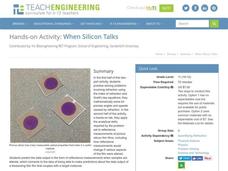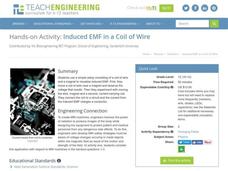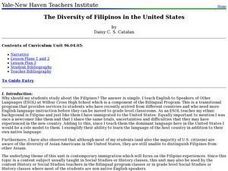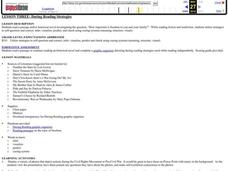Teach Engineering
Electricity and Magnetic Fields
Introduce your class to the idea of magnetic fields around electrical wires with an activity that provides the information about the direction of a magnetic field around a wire carrying an electric current.
Teach Engineering
Circuits and Magnetic Fields
Have your class use compasses to try to find the magnetic field around an electric current. Groups use the same technique to visualize magnetic fields as they did in the second activity in the series, but this time, the field is created...
Teach Engineering
Thinking Green!
Encourage your class to solve local environmental issues. Groups brainstorm environmental issues that are affecting the community, choose one they want to solve, and design a product or service to solve their chosen issue. They then...
Teach Engineering
Water Remediation Lab
Water filtration — that's pure genius! Groups test the ability of a water filter to purify water by running chlorine contaminated water through a filter and measuring the chlorine concentrations as they filter the water. They then graph...
Teach Engineering
Red Cabbage Chemistry
Using the natural pH indicator of red cabbage juice, groups determine the pH of different everyday liquids. As they work, pupils gain an understanding of pH that may help deal with contaminants in the water supply.
Teach Engineering
Making Model Microfluidic Devices Using JELL-O
Nothing flows like J-E-L-L-O! In the final portion of a four-part series, pupils create scale models of microfluidic devices out of gelatin and bendable straws. They use their devices to test various flow rates in the delivery of...
Teach Engineering
Exploring Capillary Action
Explore capillary action from different perspectives. In the fourth installment of a nine-part series, scholars perform several experiments to observe capillary action. They look at the meniscus of water in a glass, observe capillary...
Teach Engineering
Wetting and Contact Angle
Explore terminology related to water droplets. The sixth installment of a nine-part series teaches young scientists about wetting and contact angles between water droplets and surfaces. It also distinguishes between hydrophobic and...
Teach Engineering
Investigating Contact Angle
Discover the properties of water-loving and water-hating surfaces. In the seventh installment of a nine-part series, scholars explore hydrophilic and hydrophobic surfaces by conducting an experiment. They observe surface coatings,...
Teach Engineering
What Does Light See?
The second installment of a seven-part series focuses on the refraction of light and how it affects the colors we see. Learners consider how this concept connects to biosensors for cancer detection.
Teach Engineering
Bubbles and Biosensors
Bubbles aren't just for children. In the third installment of a seven-part series, teenagers use bubble solution to create bubbles and observe patterns of refraction on the bubble surfaces. Application of this concept to thin films in...
Teach Engineering
When Silicon Talks
Explore Snell's Law using thin films. In the fifth installment of a seven-part series, pupils solve a set of problems relating to Snell's Law and use this skill during an experiment requiring the collection of reflective measurements...
Teach Engineering
Nanotechnology Grant Proposal Writing
Please, sir, can I have a few thousand dollars for my research? The last installment in a six-part lesson has the pupils develop a grant proposal. Class members apply their knowledge of skin cancer, ultraviolet radiation, human skin, and...
Teach Engineering
The Grand Challenge: Fix the Hip Challenge
It may be time to get to know the skeletons in your family. The first instructional activity in a series of 5, introduces the class to the concept of osteoporosis. The class members brainstorm possible causes and whether the family...
Teach Engineering
Concentrated Solar Power
The seventh segment in an eight-part unit promotes the idea of concentrating the sun to increase the power of a photovoltaic panel. Pupils learn about devices used such as reflectors or lenses.
Teach Engineering
Solar Angles and Tracking Systems
The sun will continue to rise in the east and set in the west, no matter what. The first lesson in a series of eight introduces the class to solar angles. It makes connections between a person's latitude and the angle of position of the...
Teach Engineering
Cell Membrane Color Sheet and Build a Cell Membrane
A cell of another color is still a cell. Pupils color a cell to identify its structures in the fourth segment of a seven-segment series. Groups work together to build a three-dimensional cell membrane segment, which is combined with...
Teach Engineering
Induced EMF in a Coil Wire
Small groups investigate the interaction between a coil of wire and a magnet to create an electromagnetic field and observe the voltage they create. Through further interactions, they realize a conductor can be charged from the...
Curated OER
Community Action
Fifth graders decide how one uses resources within a particular bioregion. For this decision making lesson, 5th graders consider the biodiversity and complexity of the ecosystem. Students select a resource (water, paper, electricity)...
Channel Islands Film
Human Impact on the Food Web of Santa Cruz Island
What happens when a non-native species is introduced onto an island? Santa Cruz Island, part of the Channel Island chain located off the coast of southern California, provides the perfect laboratory for young environmental scientists to...
Curated OER
The Diversity of Filipinos in the United States
ELLs are introduced to the experiences of Filipino immigrants to the United States. As a class, they discuss the various waves of immigration to the United States and state the reasons why they would leave the Philippines. They compare...
Curated OER
Skill Building for Educational and Vocational Advancement
Over ten weeks, 8th graders refine their visions of future careers, develop skills needed to write resumes and business letters, and learn to make a strong impression at interviews. Three specific activities are included, but mostly the...
Curated OER
During Reading Strategies
"How important is freedom to you and your family?" The guiding question becomes much more powerful after your class reads and responds to a passage from a historical novel. While reading the passage, they complete a graphic organizer...
What So Proudly We Hail
The Meaning of America: Freedom and Religion
The United States of America was founded on firm ideals of both the pursuit of happiness and a spirit of reverence. Through a close reading of Nathaniel Hawthorne's "The May-Pole of Merry Mount," you can examine what some consider was a...

























